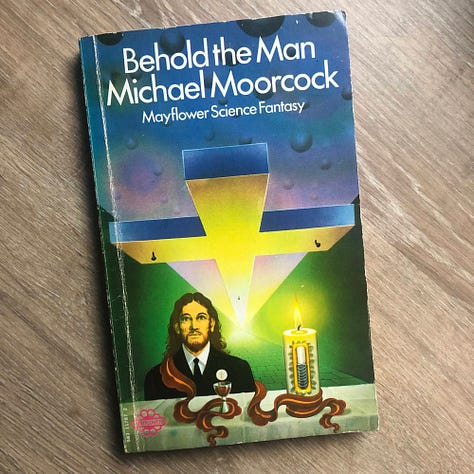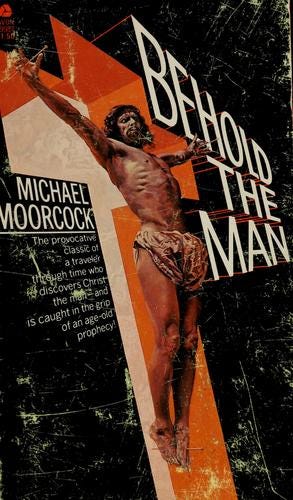Worth A Read #3 - Behold The Man by Michael Moorcock
Never meet your heroes, not even Jesus...



One book, three covers, three different target readerships.
(*** NB - Contains spoilers ***)
Banning - and in some cases burning - books is currently a Big Topic in the world among certain repressive nutjobs.
I think the argument is that certain books Corrupt Young Minds.
By this, of course, they mean “encourage young minds to think”, which is the last thing any sort of religious or political organisation wants their followers to do, or anybody else for that matter.
I got seriously into reading sci-fi books when I was sixteen. I was blown away by the variety and horizons offered by the likes of Isaac Asimov, Brian Aldiss, Philip K. Dick and Arthur C. Clarke in those uniform paperback editions, printed on very cheap paper for the maximum audience.
For 50p a time, you could have your imagination taken literally wherever you could imagine, and some places you couldn’t have imagined, and plenty of places you probably would have preferred not to have imagined, but once these books took you there, you were hooked.
I thought I should probably investigate Michael Moorcock when I read a Conan The Barbarian comic featuring his strongly Conan-adjacent character Elric Of Melnibone.
The downright weirdness of his name intrigued me for a start. I looked for his section on my next visit to the comic and sci-fi shop and picked up The Jewel In The Skull, the first Dorian Hawkmoon book.
I was confused that the evil force in the Hawkmoon books were from “Granbretan”, a bastardised version of “Great Britain”.
Are we the baddies?
But the bit on the back cover about the jewel embedded in Hawkmoon’s skull potentially eating its way into his brain that sold me.
And this naturally led to me noticing Behold The Man in the Moorcock section on a subsequent visit.
I was repulsed but intrigued by what I read on the back cover. So I bought it, obviously.
And while I hate any attempt at removing books from shelves because you don’t think they are Suitable, I would reluctantly accept that, from the point of view of a repressive nutjob, they were right. My Young Mind was well and truly Encouraged To Think, or Corrupted as they call it.
The Time Machine is a sphere full of milky fluid in which the traveller floats enclosed in a rubber suit, breathing through a mask attached to a hose leading into the wall of the machine.
The sphere cracks as it lands and the spilled fluid is soaked up by dust. The sphere begins to roll, bumping over barren soil and rocks.
Oh, Jesus! Oh, God! Oh, Jesus! Oh, God! Oh, Jesus! Oh, God! Oh, Jesus! Oh, God! Christ! What’s happening to me? I’m fucked. I’m finished. The bloody thing doesn’t work. Oh, Jesus! Oh, God! When will the bastard stop thumping!
Karl Glogauer curls himself into a ball as the level of the liquid falls and he sinks to the yielding plastic of the machine’s inner lining.
Thus begins Michael Moorcock’s Behold The Man, a brilliant, crazed polemic on religion and belief; a classic example of the “man1 goes back in time and becomes part of history” trope; and a book that had a massive effect on this devout Catholic teenage kid, just as he was beginning to question certain…assumptions presented to him as fact since infanthood.
So, our man Glogauer, obsessed with Jesus, goes back in time to Judea in AD 28 to meet the Saviour and perhaps renew his faith.
Of course he does. Give any proper-believing Christian a time machine and that’s exactly what he’d do.
If you gave a Star Wars fan a time machine they’d head for that galaxy far away, a long time ago, or if you gave a Star Trek fan a time machine he’d boldly go off into the future, having first worked out what the hell those Star Dates mean.2
Scattered amongst the main narrative are the life events that have brought Glogauer to the extreme step he takes in search of Truth.
These are laid out for the reader in a series of flashbacks to his childhood and teenage years, his previous relationships, and his abuse as a young boy at the hands of a curate. We also see in retrospect the events leading up to his departure to the first century AD.
Glogauer’s time capsule crashes and is broken beyond repair, but he is rescued by John The Baptist, who is already making waves locally as the Prophet who predicts the imminent coming of the Messiah.
He makes his way to Nazareth, where he successfully seeks out the Biblical Joseph and Mary, asks if they have a son called Jesus and is answered in the affirmative.
Nothing I have ever read before or since comes close to how shocked I was at the scene where Glogauer is introduced to the real-life Jesus behind the subsequent mythology:
The figure was misshapen. It had a pronounced hunched back and a cast in its left eye. The face was vacant and foolish. There was a little spittle on the lips. ‘Jesus?’ It giggled as its name was repeated. It took a crooked, lurching step forward.
‘Jesus,’ it said. The word was slurred and thick. ‘Jesus.’
‘That’s all he can say,’ said the woman. ‘He’s always been like that.’
‘God’s judgement,’ said Joseph.
Glogauer realises that somebody has to step in and ensure history happens in the “correct manner” in order for Christian history to happen.3
So he sets out to retrospectively fulfil the gospels.
Since he had never been able to bear to think that Jesus had been nothing more than a myth, it became a duty to himself to make Jesus a physical reality rather than the creation of a process of mythogenesis.
Giving the appearance of having healed the sick is a doddle:
When he saw the sick, he pitied them and tried to do what he could because they expected something of him.
Many he could do nothing for, but others, obviously with easily remedied psychosomatic conditions, he could help.
They believed in his power more strongly than they believed in their sickness. So he cured them.
As is predicting the future, very locally and very specifically.
The news had spread that the man really could foretell the future, that he had already predicted the arrest of John by Herod Antipas and soon after Herod had imprisoned the Baptist at Peraea.
That was what impressed them. He did not make his predictions in general terms, using vague words the way other prophets did.
He spoke of things that were to happen in the near future and he spoke of them in detail.
Glogauer, despite his growing follower count and therefore power, does not speak out against the execution by King Herod of John The Baptist, because it is written that he has to die.
He selects his twelve Apostles by choosing followers called Peter or Matthew or Judas and so on. He instructs Judas to betray him, to Judas’ puzzlement.
He begins admitting that the rumours are true and his name is Jesus.
And he makes his way toward his inevitable, horrible martyrdom against the future panning out as it “should”.
Epilogue
There is a clearer message in this novel than any of the other Moorcock books I’ve read.4
We all want to believe in something. We all NEED to believe in something.
So we will excuse and contort the evidence of our own senses until it matches what we want it to.
For myself, although I don’t do organised religion any more, I DO still need to believe in something, despite being continually disappointed when the things I want to believe in fail me, whether it’s a political ideology I’ve held, a sports team I’ve followed or a geek fandom I’ve embraced.
We all kid ourselves, but Karl Glogauer went a step further and created the myth himself, so that people could believe in it.
I was horrified at the ending when I was a young believer, but as an older apostate, I think its actually quite beautiful, in an odd way.
Links
Other posts you may enjoy:
"I Capture The Castle" by Dodie Smith
There's Something About Susans (CS Lewis / Alan Garner)
"The Owl Service" by Alan Garner
Thank you. Come again.
I figured that one out a lot later in life, sad to say.
The gender is an essential part of describing the genre. It’s ALWAYS a man who does this, possibly accompanied by a younger, attractive woman, but not in this case.
If you gave a Dr. Who fan a TARDIS, of course, he’d go back to 1963 and make sure he made multiple pristine off-air recordings of all the lost Sixties episodes, hide them all somewhere safe then return to his own time and watch them all. On his own. He’d never let anybody else watch them, although he would hint obliquely at owning them online.
It’s a bugbear of mine that in “divergent history” stories, the world we know is regarded as the only proper one. Probably a subject for another day, as frankly I suspect I may be pushing it with these footnotes as it is.
Although that is by no means all or even a significant percentage.





I have the book with cover 3 but the first Mayflower cover is wonderful!